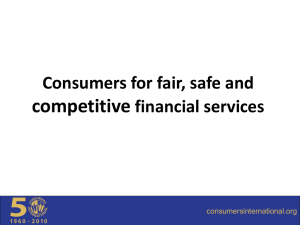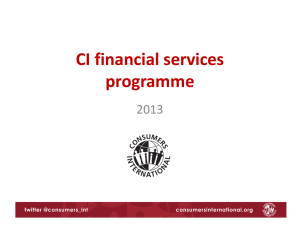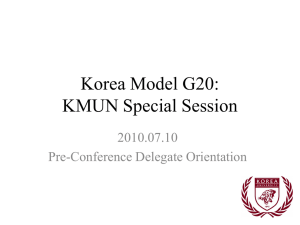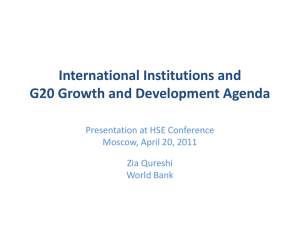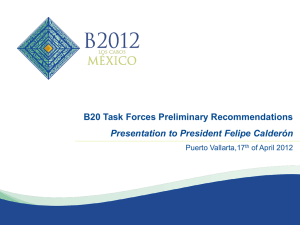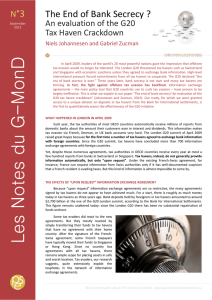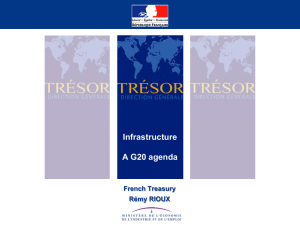Recommendations of the Civil 20 on the G20 and Post
advertisement
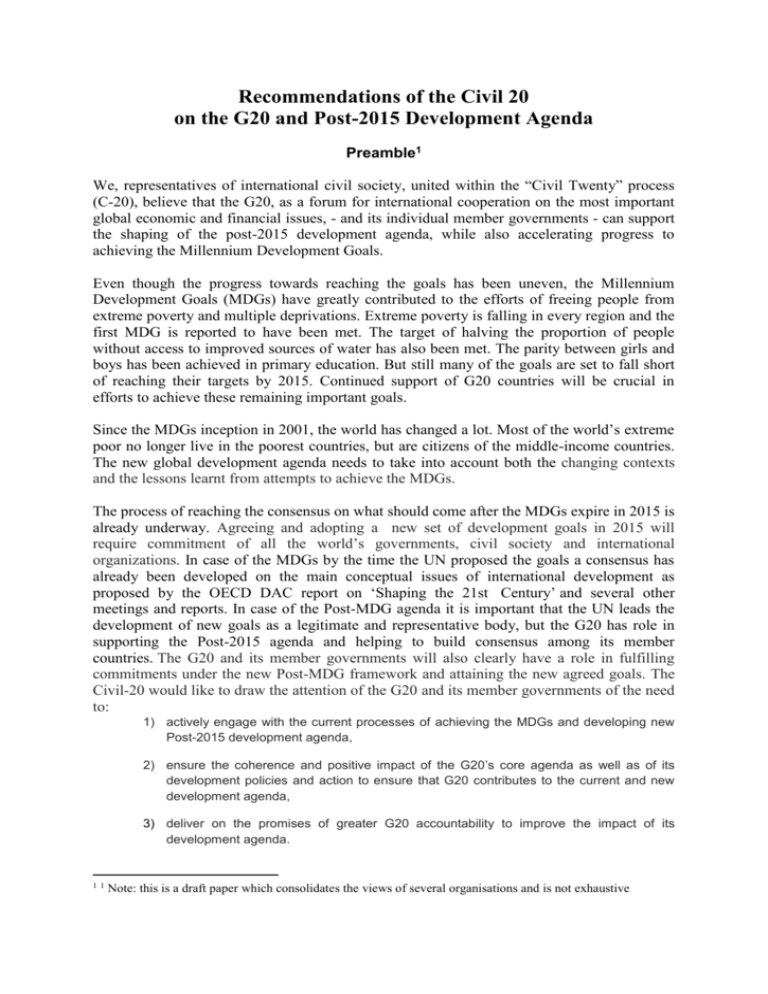
Recommendations of the Civil 20 on the G20 and Post-2015 Development Agenda Preamble1 We, representatives of international civil society, united within the “Civil Twenty” process (С-20), believe that the G20, as a forum for international cooperation on the most important global economic and financial issues, - and its individual member governments - can support the shaping of the post-2015 development agenda, while also accelerating progress to achieving the Millennium Development Goals. Even though the progress towards reaching the goals has been uneven, the Millennium Development Goals (MDGs) have greatly contributed to the efforts of freeing people from extreme poverty and multiple deprivations. Extreme poverty is falling in every region and the first MDG is reported to have been met. The target of halving the proportion of people without access to improved sources of water has also been met. The parity between girls and boys has been achieved in primary education. But still many of the goals are set to fall short of reaching their targets by 2015. Continued support of G20 countries will be crucial in efforts to achieve these remaining important goals. Since the MDGs inception in 2001, the world has changed a lot. Most of the world’s extreme poor no longer live in the poorest countries, but are citizens of the middle-income countries. The new global development agenda needs to take into account both the changing contexts and the lessons learnt from attempts to achieve the MDGs. The process of reaching the consensus on what should come after the MDGs expire in 2015 is already underway. Agreeing and adopting a new set of development goals in 2015 will require commitment of all the world’s governments, civil society and international organizations. In case of the MDGs by the time the UN proposed the goals a consensus has already been developed on the main conceptual issues of international development as proposed by the OECD DAC report on ‘Shaping the 21st Century’ and several other meetings and reports. In case of the Post-MDG agenda it is important that the UN leads the development of new goals as a legitimate and representative body, but the G20 has role in supporting the Post-2015 agenda and helping to build consensus among its member countries. The G20 and its member governments will also clearly have a role in fulfilling commitments under the new Post-MDG framework and attaining the new agreed goals. The Civil-20 would like to draw the attention of the G20 and its member governments of the need to: 1) actively engage with the current processes of achieving the MDGs and developing new Post-2015 development agenda, 2) ensure the coherence and positive impact of the G20’s core agenda as well as of its development policies and action to ensure that G20 contributes to the current and new development agenda, 3) deliver on the promises of greater G20 accountability to improve the impact of its development agenda. 11 Note: this is a draft paper which consolidates the views of several organisations and is not exhaustive G20 and Post-MDG Processes 1. Demonstrate political will and consolidate financial resources to achieve the current MDGs The G20 should ensure that the UN process to develop the Post-MDG agenda does not impede the achievement of the current MDGs, does not distract the world’s attention from it and does not abandon then without making every possible effort to achieve them. Reaching the MDGs should be a top priority that lays the groundwork for even greater achievements after 2015. The G20 should: a. Call on its member governments to demonstrate and act on their commitment towards achieving the MDG b. call on its member governments to commit sufficient resources to make MDGs a reality c. promote a beyond aid agenda and agree on innovative financing mechanisms to accelerate progress to meet the current MDGs, and to contribute to achieving goals of the new Post-MDG framework. 2. Support the current UN Post-2015 process The G20 should encourage open, inclusive and transparent process of reaching a consensus on Post-2015 Development agenda. The efforts currently undertaken by the UN to develop and agree goals should not be supplanted but rather supported and endorsed. While supporting the current UN process, the G20 should use its comparative advantage as the premier economic forum, to build consensus for a post2015 framework among key global players, especially the emerging powers and BRICS countries. G20 and its member countries should: a. deliver a collective statement - in support of the UN-led inclusive consultation process on the post-2015 agenda in 2013, endorsing a bottom-up process for development of the post-2015 framework and the full inclusion of southern perspectives in the new framework - calling for the need to provide good delineation between the role of G20 and that of other bodies, to ensure that the roles of international organizations in the Post-2015 process are mutually supportive and do not duplicate each other b. prioritize combating inequality and reaching adequate level of life for all the world population as the core of new agenda that integrates economic growth, social inclusion and environmental protection, but let the detailed goals and indicators setting to be developed by UN led process 3. Support the current UN process inputs by providing inputs in the areas of G20 expertise Whilst the UN will lead on developing new goals and targets including on economic issues, the G20 can support and complement the UN process already underway by developing a coherent agenda to narrow the development gap and deliver fairer economic growth across the world. The work of the G20 to achieve strong, sustainable and balanced growth will be supported by the formulation of a single and cohesive post-2015 development agenda that integrates economic growth, social inclusion and environmental protection. G20 should: a. contribute to the debates and share experience regarding economic objectives and policies by - taking stock of evidence on global inequalities, their impact on growth and development and policies that help to overcome inequality to help define how inequality could be tackled in a global agreement after 2015 - focusing on underlying drivers of poverty and sharing experience and best practices in areas like infrastructure, narrowing the productivity gap between rich and poor countries, food security, inclusive green growth, anti-corruption and human resource skills development The G20's Development Agenda and the post-2015 Framework As G20 leaders explained in Seoul in 2010: “Narrowing the development gap and reducing poverty are integral to our broader objective of achieving strong, sustainable and balanced growth and ensuring a more robust and resilient global economy for all.” This commitment means the G20’s policies and practices as a whole must contribute to reducing inequality and tackling poverty head-on. In addition to ensuring their own compliance with actions and targets decided under a UN post-2015 process, the G20 should revisit its own development agenda and Development Working Group (DWG) to ensure that it is supportive of a new framework. 1. Reprioritisation of the Seoul Multi Year Action Plan The expiry of the Seoul Multi Year Action Plan (MYAP) commitments offers an opportunity for the G20 as a whole to reformulate and reprioritise its work on development and the work of the G20 Development Working Group and to make specific commitments regarding the G20 broader development agenda. The DWG now has an opportunity to take on a new agenda for delivering fairer economic growth in developing countries. Specific, measureable commitments on the key issues need to be central to the successor to the MYAP, so that the DWG becomes more focused on delivering fairer economic growth in developing countries, and on achieving the development objectives the G20 itself has agreed G20 should: Prioritise the following crucial areas, making them - with specific measurable targets and indicators - the basis of the successor of the MYAP - - - Deliver and measure a reduction in inequality Ensure food security including by addressing the root causes of food insecurity and the consequences of food price volatility Take action to tackle tax havens and improve tax transparency so that poor countries do not lose the revenue they need to invest in ending poverty and inequality Agree on innovative financing mechanisms to narrow the development gap and accelerate progress to meet and exceed the MDGs, and to ensure the achievement of the post-2015 Development Goals Support implementation of a rights-based social protection floor that is truly supportive of poor men and women's economic role throughout their lifecycle and which seeks to integrate crisis responses and long-term social protection systems. 2. Ensure that G20 core policies have a positive impact on Development While the multi-year action plan (MYAP) is one way in which the G20 can support a new Post-MDG framework, the core G20 macroeconomic and financial policy coordination and structures have a significant impact on development. Improving the development dimensions of the G20’s core polices would be a huge step forward for the G20. In order to achieve this development coherence, the G20 should: broaden its development focus to explicitly cover the implications of G20 core actions, for example to promote development-friendly financial and trade regimes, deal with global imbalances, tackle energy subsidies and natural resource management institutionalize outreach meetings with developing countries, and require the DWG to becomes more representative, and the low-income countries form half of the DWG’s membership. institutionalise Civil 20 and require DWG become more transparent, and engage with civil society on an ongoing basis (on a par with B20 and L20 consultations). allow more equal and systematic access to developing country governments and civil society to G20 processes, as well as better coordination with more inclusive UN processes. 3. G20 Accountability The need for G20 to have proper functioning accountability mechanisms is well understood. In relation to the Post-MDG process, greater G20 accountability would mean better understanding of the G20’s contribution to thatdevelopment agenda, and the foundation would be laid for the proper planning of its ongoing contribution to the attainment of the new goals. The Los Cabos Accountability Assessment Framework (Framework) outlines G20 plans to assess its progress in meeting its commitment to strong, sustainable and balanced growth. Civil society welcomes the those commitments as well as the intention “to build on an innovative global development partnership that will focus on concrete and sustainable results, deepening our engagement with the private sector and civil society”2. In order to achieve this enhanced accountability, the G20 should: publish in advance the terms of reference and member information for working groups and review mechanisms, make available for public comment all expert group and commissioned reports, assessments and recommendations scheduled for presentation at the summit., publish advance meeting notices that include a list of the G20 commitments and outcomes under review establish clear rules requiring all G20 working groups and peer review mechanisms to seek substantial input from civil society, the private sector and affected communities At this G20 summit, the G20 has an important opportunity to improve its development impact and to ensure its positive contribution to a new Post-MDG development framework, as outlined in the above recommendations. The G20 must step up to the challenge to prove its relevance to the poorest countries and to the world’s poorest people, and to demonstrate they are taking a long-term view on the world’s interests. 2 expressed in 2011 Report of the Development Working Group (par.68).
